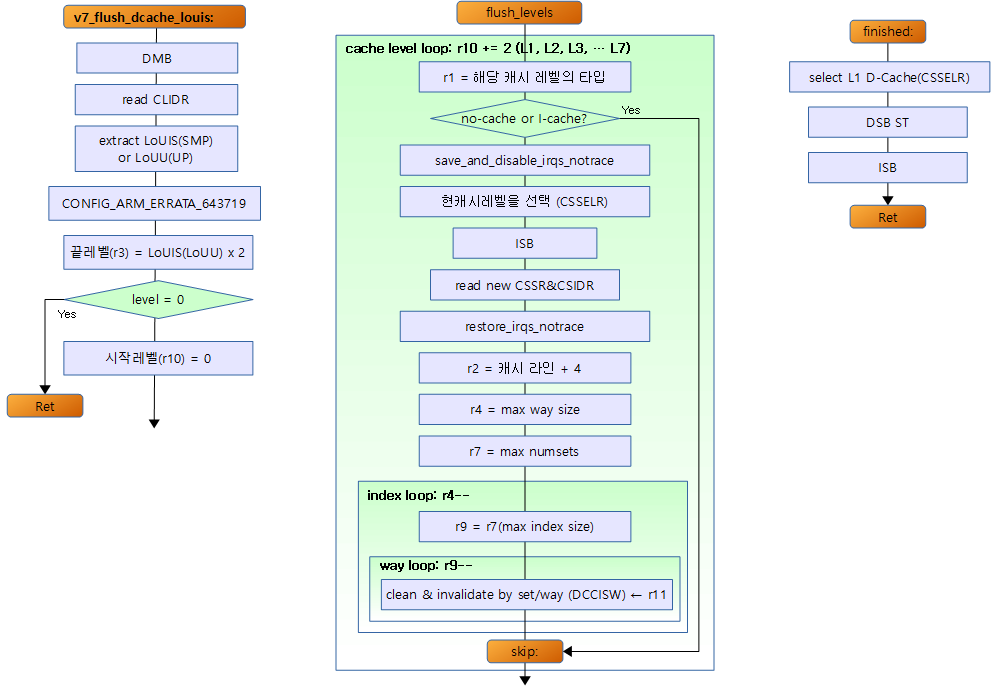- compressed/head.S 에서 사용하였던 __armv7_mmu_cache_flush: 루틴과 거의 동일하다.
- 데이터 캐시를 지우라고 요청하면 SoC 정보를 확인하여 지원하는 최종 캐시레벨을 확인한 후 L1 부터 해당 캐시 레벨까지 flush한다.
- 해당 캐시 레벨에서는 index와 way를 사용하여 하나씩 삭제한다.

hierarchical cache
- ARMv6 아키텍처까지는 ARM 아키텍처에서 L1 캐시만 지원하였었다.
- ARMv7 아키텍처부터 다단계의 캐시를 지원하게되었다.
- 다단계 캐시, ARM에서는 hierarchical cache 구조 라고 한다.
v7_flush_dcache_louis()
arch/arm/mm/cache-v7.S
/*
* v7_flush_dcache_louis()
*
* Flush the D-cache up to the Level of Unification Inner Shareable
*
* Corrupted registers: r0-r7, r9-r11 (r6 only in Thumb mode)
*/
ENTRY(v7_flush_dcache_louis)
dmb @ ensure ordering with previous memory accesses
mrc p15, 1, r0, c0, c0, 1 @ read clidr, r0 = clidr
ALT_SMP(ands r3, r0, #(7 << 21)) @ extract LoUIS from clidr
ALT_UP(ands r3, r0, #(7 << 27)) @ extract LoUU from clidr
#ifdef CONFIG_ARM_ERRATA_643719
ALT_SMP(mrceq p15, 0, r2, c0, c0, 0) @ read main ID register
ALT_UP(reteq lr) @ LoUU is zero, so nothing to do
ldreq r1, =0x410fc090 @ ID of ARM Cortex A9 r0p?
biceq r2, r2, #0x0000000f @ clear minor revision number
teqeq r2, r1 @ test for errata affected core and if so...
orreqs r3, #(1 << 21) @ fix LoUIS value (and set flags state to 'ne')
#endif
ALT_SMP(mov r3, r3, lsr #20) @ r3 = LoUIS * 2
ALT_UP(mov r3, r3, lsr #26) @ r3 = LoUU * 2
reteq lr @ return if level == 0
mov r10, #0 @ r10 (starting level) = 0
b flush_levels @ start flushing cache levels
ENDPROC(v7_flush_dcache_louis)
- mrc p15, 1, r0, c0, c0, 1
- LoUU/LoUIS를 추출하기 위해 CLIDR을 읽어온다.
- ALT_SMP(ands r3, r0, #(7 << 21))
- SMP 시스템에서 CLIDR의 LoUIS 필드를 추출해온다.
- ERRATA_643719
- 특정 프로세서의 CLIDR.LOUIS가 잘못 기록이 되어 있어서 이를 보정해주는 코드
- Cortex-A9 r1p0 이전 버전에서 LoUIS 값이 1이 아닌 0으로 기록된 것을 잡아준다.
- ALT_SMP(mov r3, r3, lsr #20)
- r3: 읽어온 값을 우측으로 쉬프트하여 LoUIS x 2와 같은 값으로 만든다.
- d-cache를 어느 캐시 레벨까지 flush할지 결정하기 위함.
- reteq lr
- 읽어온 LoUIS가 0이면 d-cache의 flush를 포기하고 루틴을 빠져나간다.
- mov r10, #0
- b flush_levels
- v7_flush_dcache_all() 루틴 중간에 있는 flush_levels 레이블을 같이 사용한다.
v7_flush_dcache_all()
/*
* v7_flush_dcache_all()
*
* Flush the whole D-cache.
*
* Corrupted registers: r0-r7, r9-r11 (r6 only in Thumb mode)
*
* - mm - mm_struct describing address space
*/
ENTRY(v7_flush_dcache_all)
dmb @ ensure ordering with previous memory accesses
mrc p15, 1, r0, c0, c0, 1 @ read clidr
ands r3, r0, #0x7000000 @ extract loc from clidr
mov r3, r3, lsr #23 @ left align loc bit field
beq finished @ if loc is 0, then no need to clean
mov r10, #0 @ start clean at cache level 0
flush_levels:
add r2, r10, r10, lsr #1 @ work out 3x current cache level
mov r1, r0, lsr r2 @ extract cache type bits from clidr
and r1, r1, #7 @ mask of the bits for current cache only
cmp r1, #2 @ see what cache we have at this level
blt skip @ skip if no cache, or just i-cache
#ifdef CONFIG_PREEMPT
save_and_disable_irqs_notrace r9 @ make cssr&csidr read atomic
#endif
mcr p15, 2, r10, c0, c0, 0 @ select current cache level in cssr
isb @ isb to sych the new cssr&csidr
mrc p15, 1, r1, c0, c0, 0 @ read the new csidr
#ifdef CONFIG_PREEMPT
restore_irqs_notrace r9
#endif
and r2, r1, #7 @ extract the length of the cache lines
add r2, r2, #4 @ add 4 (line length offset)
ldr r4, =0x3ff
ands r4, r4, r1, lsr #3 @ find maximum number on the way size
clz r5, r4 @ find bit position of way size increment
ldr r7, =0x7fff
ands r7, r7, r1, lsr #13 @ extract max number of the index size
loop1:
mov r9, r7 @ create working copy of max index
loop2:
ARM( orr r11, r10, r4, lsl r5 ) @ factor way and cache number into r11
THUMB( lsl r6, r4, r5 )
THUMB( orr r11, r10, r6 ) @ factor way and cache number into r11
ARM( orr r11, r11, r9, lsl r2 ) @ factor index number into r11
THUMB( lsl r6, r9, r2 )
THUMB( orr r11, r11, r6 ) @ factor index number into r11
mcr p15, 0, r11, c7, c14, 2 @ clean & invalidate by set/way
subs r9, r9, #1 @ decrement the index
bge loop2
subs r4, r4, #1 @ decrement the way
bge loop1
skip:
add r10, r10, #2 @ increment cache number
cmp r3, r10
bgt flush_levels
finished:
mov r10, #0 @ swith back to cache level 0
mcr p15, 2, r10, c0, c0, 0 @ select current cache level in cssr
dsb st
isb
ret lr
ENDPROC(v7_flush_dcache_all)
- decompressed/head.S에서 d-cache를 flush한 로직과 거의 흡사하다.
- way와 index 루프 순서만 기존과 바뀌었다.



